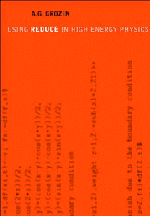2 - Selected problems in classical physics
Published online by Cambridge University Press: 20 October 2009
Summary
Classical nonlinear oscillator
No physical problem can be solved absolutely exactly: all phenomena in Nature are interrelated, and an infinite number of factors should be taken into account. Therefore, it is necessary to separate the most essential factors, the less essential ones, and the practically inessential ones. If you are lucky, then the idealized problem, taking into account only the most important factors, is exactly solvable. The influence of less important factors can then be accounted for by perturbation theory, i.e. as a series in powers of dimensionless small parameters characterizing the influence of these factors on the considered phenomenon.
Perturbation theory corrections do not always produce only insignificant quantitative changes to the unperturbed problem solution: sometimes they can lead to qualitatively new phenomena. For example, in the nonlinear oscillator problem, a dependence of the oscillation frequency on the amplitude appears in the second order of perturbation theory. In quantum mechanical problems, energy levels which were degenerate in the absence of a perturbation may split. Finally, in elementary particle physics, one starts from the case of noninteracting particles and considers the interaction as a perturbation. Physically interesting processes of scattering and decay then appear in various orders of perturbation theory.
Usually the complexity of calculations in perturbation theory rapidly grows with increasing order, but the rules for calculating the terms in the series are relatively simple and can be easily converted to algorithms.
- Type
- Chapter
- Information
- Using REDUCE in High Energy Physics , pp. 81 - 112Publisher: Cambridge University PressPrint publication year: 1997



